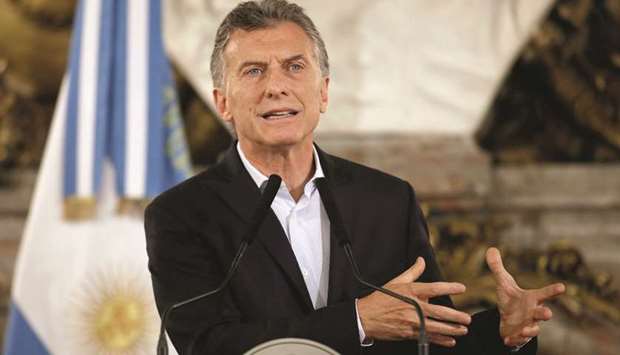Argentina’s Congress passed a reform to the pension system early yesterday, after days of demonstrations by the bill’s opponents and violent clashes between protesters and police gripped the South American country.
The measure, central to President Mauricio Macri’s plan to slash the fiscal deficit and attract investment, changes the formula used to calculate benefits.
It links them to consumer prices instead of increasing them in line with tax income and wage hikes.
Economists, noting that inflation expectations are lower, said that the new method would make it easier to slash the fiscal deficit.
It passed the lower chamber of deputies after an all-night debate session by a vote of 128-116, with two abstentions.
The Senate approved the proposal last month.
It was a victory for Macri, who does not have a majority in Congress and took office in December 2015 after more than a decade of populist rule.
The government will press ahead with congressional votes on a tax code overhaul and a plan to limit provincial spending, Macri told reporters.
“This formula guarantees that over the next few years, retirees will never lose against a jump in inflation,” he said. “All these changes generate discomfort, but they are necessary.”
Other leaders in South America have had a harder time implementing similar business-friendly agendas.
In Peru, President Pedro Pablo Kuczynski has fought efforts to remove him over his ties to scandal-plagued Brazilian builder Odebrecht, which threaten to stall reforms meant to boost growth.
Brazil’s efforts at its own pension reform were recently pushed back until next year.
In Argentina, a strong performance in October’s legislative midterms gave Macri’s coalition government strong momentum.
Still, the pension measure generated fierce criticism from opposition lawmakers and labour unions, who say it will hurt retirees.
It was initially slated for debate last Thursday, but the session was suspended after police fired rubber bullets and tear gas at demonstrators outside the capitol.
Macri then promised to decree a one-time bonus payment to the neediest retirees, and the government said that pensions would rise by five percentage points above inflation in 2018.
But that did not win over demonstrators who took to the streets of the capital Buenos Aires and around the country late on Monday, banging pots and pans and blaring car horns.
“They are encroaching upon the rights of society’s most vulnerable,” opposition lawmaker Facundo Moyano said during the congressional debate.
Earlier on Monday, protesters outside the capitol threw stones at police, who responded with tear gas and water cannons, while the country’s main union called a 24-hour general strike.
Dozens were injured and some 60 people were detained, state-run news agency Telam said, in one of Argentina’s most violent protests in years.
The government is seeking to slash its primary budget deficit, which excludes interest payments, to 3.2% of gross domestic product (GDP) next year from 4.2% this year.
The new formula means the government will save around 61bn pesos ($3.49bn), or 0.5% of gross domestic product next year, though the one-time bonus could reduce savings by up to 4bn pesos, according to Buenos Aires consultancy Elypsis.

Macri: This formula guarantees that over the next few years, retirees will never lose against a jump in inflation.
